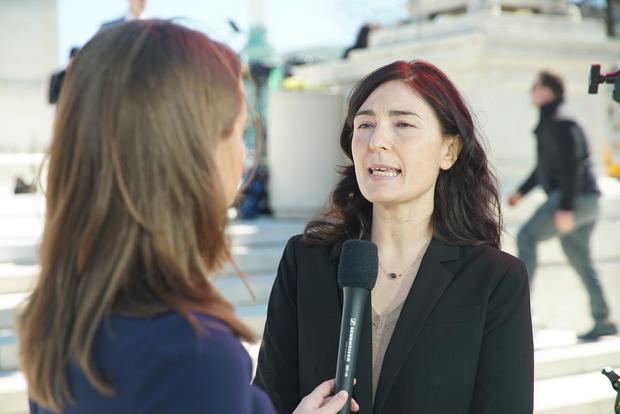Julie Rikelman, an attorney at the Center for Reproductive Rights, has spent years working on June Medical Services v. Russo, a Supreme Court case that could dramatically alter abortion access in the United States.
All that work was realized Wednesday during oral arguments when Rikelman was given 30 minutes to deliver arguments and take questions from justices on the newly-conservative high court. Speaking from the steps of the Supreme Court immediately following the hearing, Rikelman said she “felt good.”
“I think I was able to answer all of the justice’s questions. I felt prepared,” Rikelman said during an interview with CBS News.
Trending News ›
At the center of Wednesday’s case is Louisiana Act 620, the “Unsafe Abortion Protection Act,” a 2014 law that requires doctors who provide abortions to have privileges to admit patients at a nearby hospital. While the state says it’s designed to improve patient safety, critics, like Rikelman’s firm, say it’s intended to shut down clinics that provide abortion.
Just weeks after it was signed into law, the Center for Reproductive Rights challenged the restrictions, largely blocking it from ever going into effect. The Supreme Court’s decision, expected later this year, will ultimately determine whether or not the law can be implemented.
Today, only one doctor currently providing abortions in the state is in compliance with the regulation. If the law were to go into effect, that physician has said he would step down, effectively making Louisiana the first state to be without an abortion clinic since Roe v. Wade, the 1973 Supreme Court decision that legalized the procedure.
On Wednesday, the Supreme Court held oral arguments, an hour-long hearing where each side presents their case and take queries from justices.
Rikelman said the justice’s questions were in line with what she was expecting.
“They asked questions about why this law could potentially be different than the Texas law,” Rikelman said, referencing Whole Woman’s Health v. Hellerstedt, a Supreme Court case in 2016 that struck down an identical law out of the neighboring state. “Why should the outcome for the state of Louisiana be different from its neighbor Texas?”
In 2016, Chief Justice John Roberts dissented from the court’s decision in Whole Woman’s Health. On Wednesday, Roberts, as well as Justice Brett Kavanaugh, asked Rikelman whether Louisiana’s admitting privileges were inherently unconstitutional or could the regulation be legal if abortion access wasn’t impacted.
“What I said is the court has already said that admitting privileges have no benefit for patients,” Rikelman said. “They do nothing for health whatsoever. And generally, laws that have no benefit, can’t be constitutional.”
The Louisiana Attorney General’s Office did not make Liz Murrill, the attorney defending the state’s regulation, available for an interview following arguments on Wednesday.
Justices, in particular Justice Samuel Alito, also questioned Rikelman on whether or not it was appropriate for abortion clinics to represent patients in cases, like Wednesday’s, that challenged abortion regulations, a question that was raised to the court by Louisiana last year. Per the state’s argument, people seeking an abortion should be capable of legally challenging abortion restrictions.
“Once a woman finds out she’s pregnant, she has only a few weeks to get an abortion and she’d have to file the case in that exact window of time,” Rikelman said. “And for our case, she’d then have to keep it going for five and a half years. The state hasn’t explained what would be different if there was a woman in this case instead of the physicians.”
In June Medical Services v. Russo, as well as more than a dozen other abortion-related cases in the Supreme Court’s pipeline, the plaintiff is an abortion provider, not a patient.
“This law applies to doctors, it doesn’t apply to the patients. It directly regulates the doctors,” Rikelman said. “It is a strategy that has been used in order to obstruct abortion is to impose requirements on doctors and clinics. So, it would be ironic if the doctors couldn’t then challenge those laws.”
Rikelman said that if the court were to side with Louisiana on the issue of standing, the impact would be “devastating.”
“The reality is that most women can not bring these cases themselves,” Rikelman said. “And the court has really recognized that before. Women are concerned about their privacy. They’re concerned about the stigma. There are protestors outside clinics in Louisiana taking pictures of people who go in and out of the clinics, and in an age of social media, it would be very difficult for a woman to keep her decision private.”


